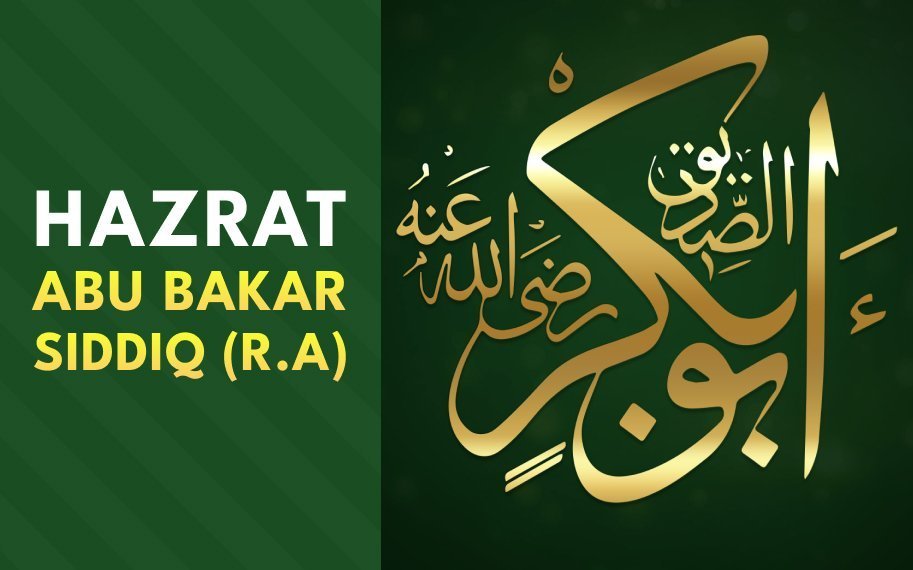
Abu Bakar Siddiq, also known as Abu Bakar, was the first Caliph after Prophet Mohammad (S.A.W.). His name was Abdullah bin Abu Quhafah Uthman bin Aamer Al Qurashi Al Taymi. His family lineage links back to the Prophet (S.A.W.) six generations earlier, through Murrah Ben Kaab.
Abu Bakar Siddiq (R.A.) was born in Makkah in the year 573 AD (Christian Era), two years and some months after the birth of the Prophet Mohammad (S.A.W.). Abu Bakar (R.A.) was brought up with decent good parents, he gained considerable self-esteem and noble status. His father Uthman Abu Quhafah accepted Islam on the Day of Victory in Makkah. His mother Salma bint Sakhar, also known as Umm Al Khair, embraced Islam early and migrated to Madinah.
Table of Contents
His Physical Appearance
Abu Bakar’s physical description is unique. Historians mentioned that he was fair-skinned and slender. Some, however, mentioned that he was fair-skinned mixed with a shade of yellow. His physical stature was such that his back leaned forward slightly. This shape, along with his being slender, resulted in his lower garment frequently coming loose. His legs were lean and muscular, but his calves were skinny. When his hair greyed, he would dye it with henna.
His Early Life
His noble lineage and upbringing by devout parents instilled in him strong moral values and a sense of righteousness. Notably, both of his parents embraced Islam, his father accepting it during the Conquest of Makkah, and his mother, Umm Al Khair, migrating to Madinah.
Embracing Islam
Known for his sincerity and unshakable faith, Abu Bakar was among the earliest converts to Islam. His unwavering support for the Prophet led to his recognition as “Al-Siddiq,” meaning “the truthful,” reflecting his steadfast belief in the Prophet’s teachings.
Title of Al-Siddiq
Known for his asceticism and modesty, Abu Bakar earned the title of “Al-Siddiq,” meaning “the truthful.” This title reflects his unshakable faith in the Prophet’s teachings, notably affirming the miraculous journey of Isra and Miraj without hesitation.
Role during Prophet’s Life
Abu Bakar played a pivotal role as a confidant and close companion of Prophet Muhammad (S.A.W). His support during pivotal moments, such as the Hijrah (migration to Madinah), showcased his unwavering dedication and loyalty to Islam.
Caliphate and Leadership
Following the Prophet’s passing, Abu Bakar ascended as the first caliph, facing the significant responsibility of leading the Muslim community. His tenure was marked by justice, wisdom, and effective governance, laying the groundwork for Islamic governance and administration.
Legacy and Impact
Hazrat Abu Bakar Siddiq’s life exemplifies humility, selflessness, and commitment to Islam. His legacy continues to resonate among Muslims globally, serving as an enduring symbol of piety, wisdom, and leadership.
Conclusion
Hazrat Abu Bakar Siddiq (R.A.) remains an inspiring figure in Islamic history, revered for his unwavering dedication to the Prophet and the cause of Islam. His leadership, principles, and contributions serve as an enduring source of guidance and inspiration for generations to come.
FAQs
Who was Hazrat Abu Bakar Siddiq (R.A.)?
Hazrat Abu Bakar Siddiq (R.A.) was the first Caliph of Islam and one of the closest companions of Prophet Muhammad (S.A.W.). He played a pivotal role in the early days of Islam.
What does the title “Al-Siddiq” mean?
The title “Al-Siddiq” translates to “The Truthful” or “The Honest.” Hazrat Abu Bakar earned this title due to his unwavering trustworthiness and honesty.
How did Hazrat Abu Bakar embrace Islam?
Hazrat Abu Bakar accepted Islam in its early days after hearing the message from Prophet Muhammad (S.A.W.). His acceptance played a crucial role in the growth of the Muslim community.
What was his role during the Prophet’s Hijrah (migration to Madinah)?
Hazrat Abu Bakar accompanied Prophet Muhammad (S.A.W.) during the Hijrah, providing invaluable support and displaying deep devotion.
How did Hazrat Abu Bakar become the first Caliph?
After the demise of Prophet Muhammad (S.A.W.), the Muslim community recognized Hazrat Abu Bakar’s leadership qualities, and he was chosen as the first Caliph through consensus.
What were his contributions as a Caliph?
Hazrat Abu Bakar’s caliphate saw successful leadership, consolidating the Muslim community, and overseeing the compilation of the Quran. He addressed various challenges with wisdom and resilience.
What is his enduring legacy in Islam?
Hazrat Abu Bakar left a lasting legacy of moral uprightness, selflessness, and dedication to Islam. His life serves as a source of inspiration for Muslims worldwide.
How is Hazrat Abu Bakar remembered in Islamic history?
Hazrat Abu Bakar is remembered as an exemplary Muslim leader, a friend of Prophet Muhammad (S.A.W.), and a paragon of truthfulness and piety in Islamic history.
Are there lessons to learn from Hazrat Abu Bakar’s life?
Yes, Hazrat Abu Bakar’s life teaches lessons of unwavering faith, trust, and selfless service to Islam. His humility and dedication serve as a model for Muslims seeking guidance.
How is Hazrat Abu Bakar revered in Islam?
Muslims hold Hazrat Abu Bakar Siddiq (R.A.) in high esteem, considering him among the greatest companions of Prophet Muhammad (S.A.W.) and a key figure in the establishment of Islam.
Read Also
Teaching the Quran to Autistic Children
Importance & Benefits of Reciting Ayatul Kursi
Learn Quran Online with Tajweed in Saudi Arabia
Genocide in Gaza and Muslims’ Reaction
Online Quran Classes For Kids & Adults
Rights of the Quran Upon Muslims
What is Janazah? All You Need To Know
10 Astonishing Scientific Miracles of the Quran
Best Online Tafseer Course With 3 Free Trial Classes
How to Choose the Right Online Quran Academy

